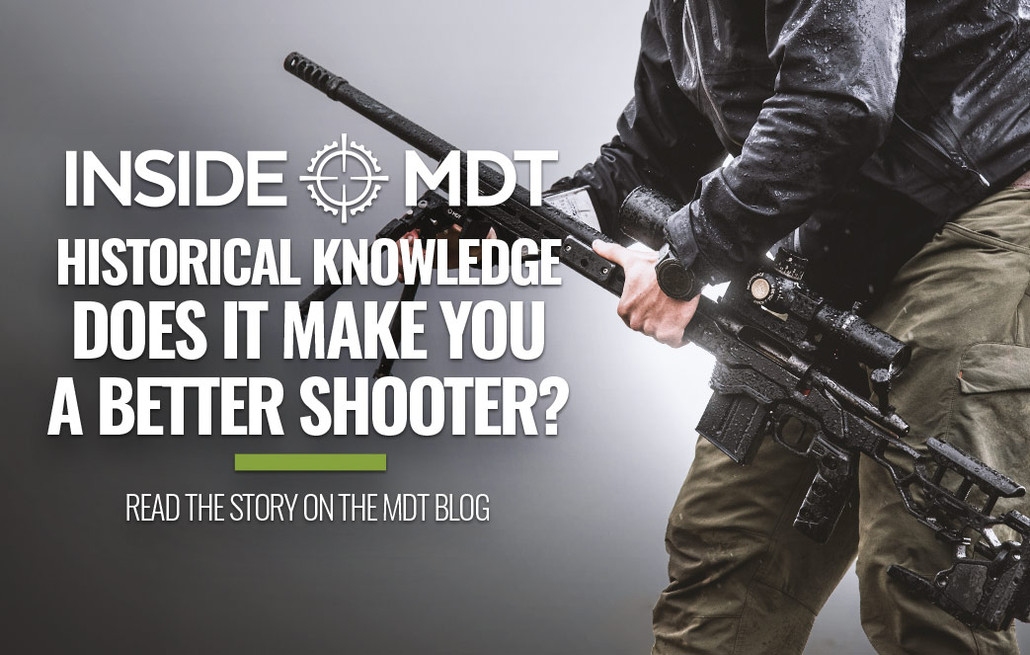Posted by Micah Noe on 2022 Mar 3rd
HISTORICAL KNOWLEDGE: DOES IT MAKE YOU A BETTER SHOOTER?
History is a topic that comes up from time to time in conversations with peers, comments from students, or with mentors. How important is it to know the history of long-range shooting? Does understanding the past drive what is happening now, and does understanding the evolution of shooting make you better at it?
In my humble opinion... no.
As with any contested topic, you will have at least two sides to the argument, if not more. There's a group of people who, beyond a shadow of a doubt, feel you must "pay respects" to those who came before and their achievements before you can "truly" understand what it means to shoot a precision rifle. In these circles, you will hear names like Chris Kyle, Chuck Mawhinney, Billy Dixon, Rob Furlong, or Carlos Hathcock spoken with such reverence you might expect a national holiday dedicated to their achievements or find their faces minted on a silver dollar. On the flip side, some literally couldn't care less about any of it. They are focused on the newest, hottest trends that are on social media—dismissing everything from the past as "old school" or outdated. I, like many others, fall somewhere in the middle.
In my opinion, it is a solid understanding of the fundamentals of marksmanship, reliable quality equipment, and purposeful, consistent application of proven techniques that will make a "better shooter." If I had to give a percentage, I'd venture to say precision rifle shooting is 90% science and 10% art...85/15 at BEST. In the end, physics, trigonometry, kinesthetics, and meteorology make up the majority of precision rifle shooting. Some skills, such as reading and compensating for constantly changing wind conditions, can be a bit of an art form.
Before we get too carried away, let me clarify a few things. First, how do I define "heritage"? For the sake of this article, I would say it is the background from which the modern-day activities, meanings, traditions, and behaviors of precision rifle shooting hail from. Heritage is made up of accolades of past shooters, learned tactics/techniques/procedures (TTP), and includes technology. Let's address each of these individually.
When it comes to the accolades or achievements of past shooters, I feel this may have the least bearing on "making a better shooter." Honestly, does someone mounting a scope to a .50 caliber Browning M2, eventually influencing the development of something like the Barrett M107A1, do anything for my ability as a precision rifle shooter? Not really. Is it a fantastic piece of history and an example of how need drives innovation? Absolutely. As for things like TTP, it can be a bit more of a gray area.
Specific lessons learned can, without question, make a better shooter. In this instance, it really depends on what the lessons learned are and the application for that lesson. For example, let's look at stalking game as a quick analogy. Things like paying attention to the wind or staying off the skyline are generally accepted as best practices during a hunt. These are lessons learned and passed on from experienced hunters to new hunters to have a more successful hunt. While things like stalking animals are ancillary skill sets to utilizing a precision rifle, different scenarios and experiences of those that have come before can certainly help shape the way we employ certain weapons systems and even drive the development of new technologies.
There is, however, a flip side to this particular coin. I can guarantee most of us have heard the phrase "slow is smooth, smooth is fast." Why is that? What does that statement even mean? If you look at it literally, if slow = smooth and smooth = fast, then slow = fast? No, slow is just slow. It can happen where a certain method can just become accepted as "the way" to do something for so long, and as it gets passed along, the original intent or technique can get lost. It then just becomes a catchphrase that gets regurgitated without any thought to what it means, or consideration is given to its validity in the present-day space.
Much like mounting a scope on a .50 caliber machine gun to fill a niche, technological advancements from past experiences can undoubtedly make for better shooters. I say that with one important caveat. The same technology and advances can also cripple a shooter. From handheld doppler LIDAR units that read the wind and automatically calculate corrections to scopes that will instantly calculate and display an aiming point in your reticle, or a rifle that even shoots itself, technology can significantly improve a shooter's overall success.
However, when all the fancy gadgetry fails, or you forget to replace your batteries, you are left with nothing but your inherent abilities. Without the fundamental skills like being able to range a target using your reticle, making wind call corrections based on your assessment of your environment, or being able to get a stable firing position behind your rifle; the technology simply becomes a crutch, masking your shortcomings and deficiencies as a shooter.
Advancements in technology can also drive significant changes in methodology and technique. This can and does, at times, negate specific ways of doing things that have been long established as the best way to do something. Take, for example, the use of tripods in precision rifle shooting. People have been shooting off sticks for as long as there have been rifles. As tripod design evolved, materials like carbon fiber and titanium made for increased stability at lighter weights, some tripods became more geared explicitly towards rifle shooting. This has driven changes in how shooters position themselves behind the rifle and even how they are designed.
In the end, as a fan of history, I can certainly appreciate the heritage of this unique hobby/sport. Many have come long before me that have progressed technology, techniques, and theory, enabling me to throw a tiny chunk of metal more than ten football fields away and hit a target the size of a cereal box. That being said, and all of those achievements and progress aside, I am still of the humble opinion it is a solid and consistent application of the fundamentals of marksmanship and quality gear that "make a better shooter."
ABOUT MICAH NOE
Micah Noe, COTA/L (@jolly914), spent 11 years in the United States Air Force working in Combat Rescue and deployed to Afghanistan 5 times. Micah splits his time between the Healthcare and the Firearms industry. He teaches for Ghost Ring Tactical in San Antonio, NM, and is the CEO and Founder of High Desert Training Partners. He is also the COO for Berserker Creative, a Utah-based media production company specializing in the outdoor/firearms communities.


 EUR
EUR
 Canadian Dollars
Canadian Dollars
